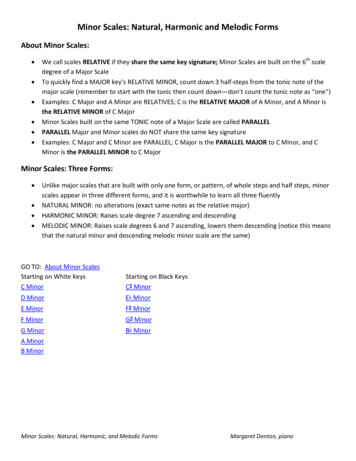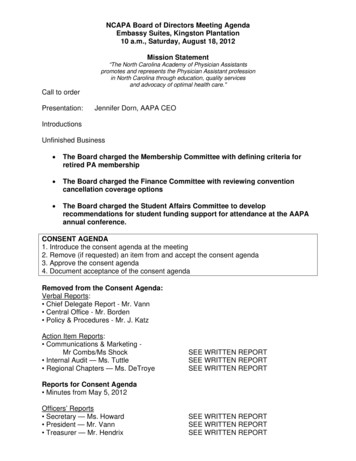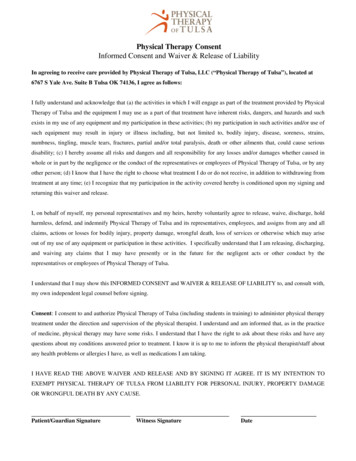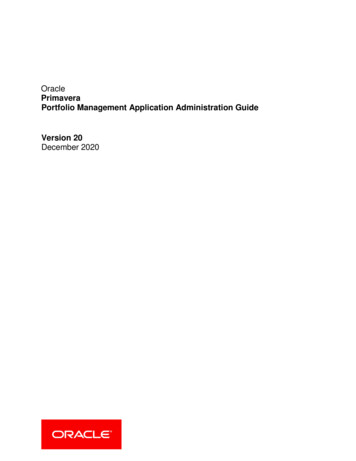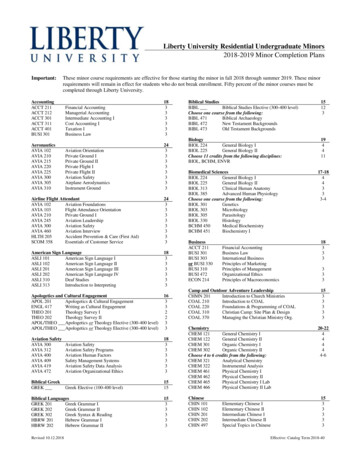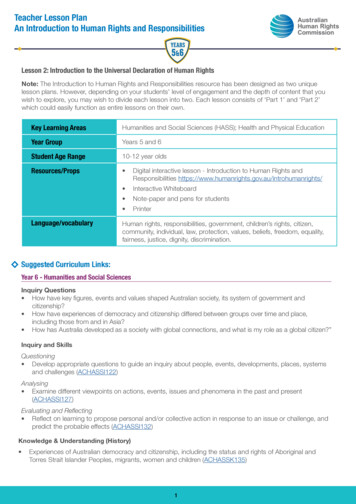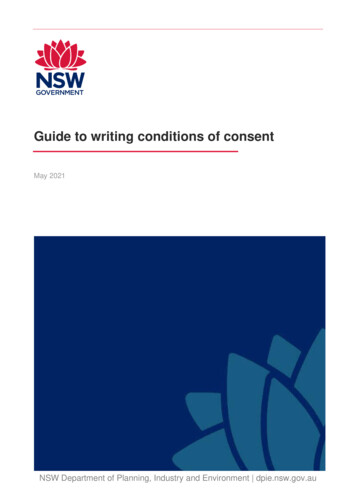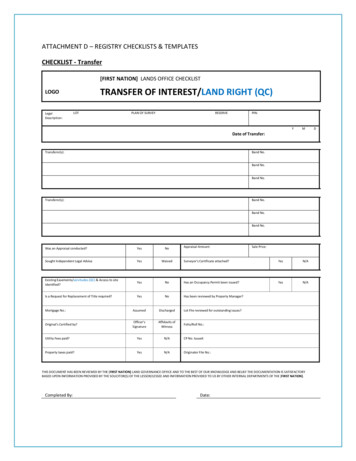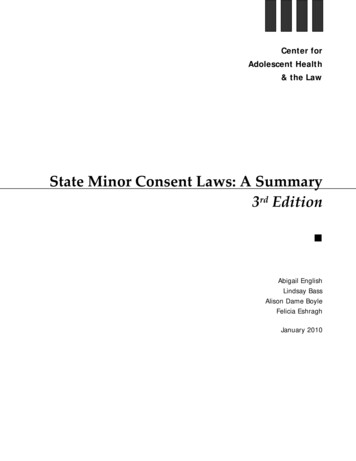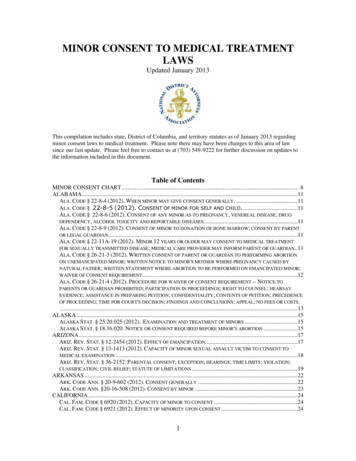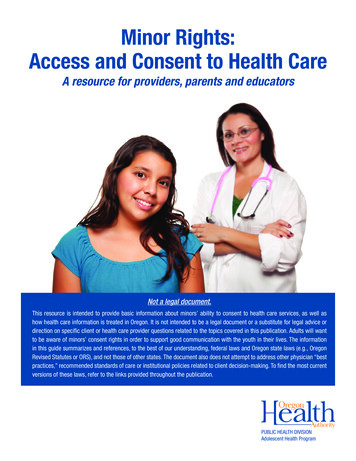
Transcription
Minor Rights:Access and Consent to Health CareA resource for providers, parents and educatorsNot a legal document.This resource is intended to provide basic information about minors’ ability to consent to health care services, as well ashow health care information is treated in Oregon. It is not intended to be a legal document or a substitute for legal advice ordirection on specific client or health care provider questions related to the topics covered in this publication. Adults will wantto be aware of minors’ consent rights in order to support good communication with the youth in their lives. The informationin this guide summarizes and references, to the best of our understanding, federal laws and Oregon state laws (e.g., OregonRevised Statutes or ORS), and not those of other states. The document also does not attempt to address other physician “bestpractices,” recommended standards of care or institutional policies related to client decision-making. To find the most currentversions of these laws, refer to the links provided throughout the publication.PUBLIC HEALTH DIVISIONAdolescent Health Program
The dilemmaThe process to ensure health care access, confidentiality and privacy can be quitecomplex when it pertains to minors. Every day, health care providers are attempting tofigure out: (1) which services a minor can obtain without parental consent; (2) when aparent can access a minor’s health information; and (3) when minor consent must beobtained before the provider can share the minor’s health information. State statutes,federal laws and regulations provide a complicated patchwork of requirements thatoften do not fit neatly together and may be challenging to interpret and implement.Unfortunately, no single rule can be applied to all situations. However, a good place to start is with a resource likethis that compiles all the requirements. Great care has been taken to present accurate information that is as clearas possible with citations to the entire text of the law or regulation. We encourage anyone wrestling with theseissues to use this document as a starting place while establishing a process that will encourage minors to seekcare while maximizing their confidentiality and privacy.Who is considered a minor and why does this matter?Under Oregon law, anyone under the age of 18 is considered a minor (ORS 419B.550[definition of minor] and ORS 109.510 [age of majority]). However, if a minor has been formallyemancipated by the courts, some laws pertaining to minors are waived (ORS 419B.552[emancipation of a minor]). See ORS 419B.550 through 419B.558 for further details.In general, a minor’s age determines whether he or she is ableto access health care services independently or if parental or guardian consent isrequired. Additionally, some services that a minor can access independently can be keptconfidential, while others cannot. This can be helpful information in order to plan themost appropriate health services for children and youth.MinorAny personunder the age of 18.Understanding consentWhat is consent?Consent is an acknowledgement (usually in writing) of any or all of the following: The patient understands the treatment he/she will receive.The patient authorizes the treatment.The patient understands how private information will be shared.All consent should be informed consent (ORS 677.097). Informed consent for health services should be verbalor in writing and includes: a description of the treatment the patient will receive, a description of alternativetreatments and a description of any risks involved with the treatment.Below are some examples of when written consent is needed: If someone outside of your health care system requests your health records; orIf you want someone else to have access to your health information.Minors may be able to request certain levels of confidentiality or consent to various health care mattersdepending on their age. Health care professionals may be able, or even required, to disclose certain healthinformation about minor patients (such as reportable diseases or suspected abuse or neglect).-1-
Common health services and consentAlthough many adults help minor children make health care decisions, there can be times whena minor child does not need or want this involvement. Below is a brief (not exhaustive) list ofcommon services and their consenting requirements in Oregon.Medical and dental services (ORS 109.640)Minors who are 15 years or older are able to consent to medical and dental services without parental consent.This includes hospital care, as well as medical, dental, optometric and surgical diagnostic care.This would include services such as: Treatment for illnesses or injuries (colds, sprained ankle);Sports or camp physicals;Dental visits (check-ups, cleanings, fillings);X-ray services;Emergency room visits;Vision care (except for first time contact lens visit); andImmunizations.Mental health and chemical dependency (ORS 109.675)A minor who is 14 years or older may access outpatient mental health, drug or alcohol treatment(excluding methadone) without parental consent. These services may include: Seeking help from a psychiatrist or psychologist; Seeking mental health therapy from a doctor or social worker; and Seeking help for drug or alcohol use.Providers are expected to involve parents by the end of the minor’s mentalhealth, drug or alcohol treatment unless: The parent refuses involvement; Clear clinical indications to the contrary exist and are documentedin the treatment record; There is identified sexual abuse; or The minor has been emancipated and/or separated from the parent forat least 90 days.For mental health and chemical dependencyservices, the provider may disclose healthinformation to a minor’s parent or guardianper ORS 109.680 if: It is clinically appropriate and in the minor’sbest interests; The minor must be admitted to a detoxificationprogram; or The minor is at risk of committing suicide andrequires hospital admission.Mental health andchemical dependency Although minors age 14 and older can access outpatient mentalhealth and chemical dependency services independently, parentsare expected to be involved in their treatment at some point. Involvement does not mean that adults always have access to aminor’s mental health or chemical dependency records. Federal regulation 42 CFR 2.14 states that if a minor is able toself-consent for drug or alcohol treatment, the minor's treatmentrecords cannot be disclosed without the minor's written consent(including to the parent or guardian).-2-
Common health services and consent, cont.Family planning/sexual and reproductive health (ORS 109.610, ORS 109.640)Minors of any age are allowed to access birth control-related information and services as well as testingand treatment for sexually transmitted infections (STIs) including HIV, without parental consent.What about consent to sex?Oregon law does not give individuals the ability to consent to sex until the age of 18;however, there are a few important points to consider. Sexual activity is a normal partof development, and according to the 2009 Oregon Healthy Teens Survey1 of 11thgrade students: Forty-eight percent have had sexual intercourse.Of those, 58 percent reported using a condom.Ensuring that young adults have proper resources and information on sexual activity is important for themto make healthy choices.Confidentiality of minor health care servicesOregon law does not give minors a “right” to confidentiality or parents a “right” todisclosure. However, federal law may offer additional protections in some circumstances.When a minor self-consents for health care services, providers are encouraged to use theirbest clinical judgment in deciding whether to share information with the parent or guardian(ORS 109.650).*‡ However, most people, minors included, expect some level of confidentialitywhen receiving health care services.Providers and adolescent patients should discuss usual confidentiality practices, as well the types of informationthat providers are required to report. This will have an impact on a minor’s willingness to seek health careservices they may have otherwise avoided. Rules that providers or facilities may have about minor confidentialityand disclosure are not intended to prohibit or discourage minors from accessing needed health care services, butto encourage proper support in the decision-making process.Oregon law does protect providers from civil liability when a diagnosis or treatment is provided to an authorizedminor without the consent of the parent or legal guardian of the minor. (ORS 109.685).* For minors who self-consent for drug or alcohol treatment services in certain settings, providers are not permitted to disclose the minor'streatment records to the parent/guardian without written consent by the minor per federal regulation 42 CFR 2.14(b).‡All clinics and/or providers who participate in Title X grant programs must follow federal regulations regarding confidentialityper 42 CFR 59.11.Sharing, protecting and accessing health informationHealth records include personal health and other identifying information. There are laws in place that help makesure these records are kept as private as possible and are only shared with those who have been authorized toreceive this information. Below is a quick overview of different forms of protection related to health records andother private information.ConfidentialityConfidentiality is an agreement between the patient and provider to ensure personal information is only sharedwith those whom the patient agrees to share information with. For the most part, providers are not allowed toshare private health information with anyone, unless a signed a release of information is on file stating otherwise.There are also national laws, such as HIPAA and FERPA, that help to protect patient confidentiality. However, thereare a few exceptions when health information can or must be shared, called mandatory reporting (see page 4 formore information).-3-
Sharing, protecting and accessing health information, cont.Mandatory reportingThere may be times when a minor’s health information must be reported to other entities. Some healthinformation must be shared with local health authorities, including cases of certain infections and communicablediseases (such as tuberculosis, West Nile virus or HIV/AIDS). This information is gathered in order tomonitor disease patterns with the goal of preventing further infections or outbreaks. To find out more aboutOregon physician reportable diseases and conditions, visit pages/index.aspx.Other times, appropriate authorities must be notified if there are health or safety concerns regarding a minorchild or vulnerable adult, even if the minor provided this information in confidence (such as abuse, neglect,or imminent harm to the minor or another person). Certain health and social service professionals in thecommunity are legally required to report these types of health and safety concerns.Mandatory reporters include (ORS 419B.005*): Doctors & NursesSocial workersTeachersDay care providersPolice officersOther state employeesMental health counselors(in certain circumstances)University and community college employeesCoaches & youth group leaders.Mandatory reporting circumstancesThere are times when confidential information must be reported: Reportable infectious and communicable diseases;Suspicion of abuse or neglect of a vulnerable individual;Entering a drug or alcohol detoxification program; andIndividual is a health or safety risk to themselves or others.Additionally, if a person is under the age of 18, there are circumstances when providers are allowed to sharethe minor’s health information with a parent or guardian (ORS 109.680). See the mental health and chemicaldependency section on page 2 for details.* Refer to ORS 419B.005 for a full, detailed list of positions that are defined mandatory reporters and those that are excluded.National privacy laws: HIPAA and FERPAWhat is HIPAA?HIPAA stands for the Health Insurance Portability and Accountability Act. This law creatednational standards to protect a patient’s identifiable information in health records. HIPAA alsoallows a patient greater access to his or her own records. HIPAA governs privacy policies inhealth care settings, hospitals and other free-standing clinics, including Oregon’s certifiedschool-based health centers.What is FERPA?FERPA stands for the Federal Education Rights and Privacy Act. This federal law is similar to HIPAA, but it appliesto the school setting and defines access to and protects the educational record of a student, including a schoolhealth record maintained by a school nurse. Under FERPA, the educational record can be requested by parentsand some school officials. However, records maintained at Oregon’s certified school-based health centers aregoverned by HIPAA, not FERPA.Both of these privacy laws are meant to protect confidential information of individuals in different settings whereprivate information is used. It is important to know what information is considered “protected” under both HIPAAand FERPA when providing and accessing health information (see page 5 for links to more information).-4-
Additional resourcesGeneral resourcesCenter for Adolescent Health and The Law - www.cahl.orgConfidentiality and Teens - 2.htmlFamily Educational Rights and Privacy Act - deral regulations on confidentiality of minor drug and alcohol treatment records (42 CFR 2.14) edocket.access.gpo.gov/cfr 2002/octqtr/42cfr2.14.htmHealth Insurance Portability and Accountability Act - /Minors rights to consent by state - www.guttmacher.org/statecenter/spibs/spib MACS.pdfOregon Adolescent Health Progam - www.healthoregon.org/ahOregon Revised Statutes (ORS) - www.oregonlaws.org and www.leg.state.or.us/orsResources for teens and parentsAdolescent health resources and links - l-links-29023.htmGuide to confidential services and information for teens - d Parenthood - www.plannedparenthood.orgSexual health resources for teens written by teens - www.sexetc.orgReferences1 Oregon Healthy Teens Survey. 2009. Data available ta.shtml.-5-
PUBLIC HEALTH DIVISIONAdolescent Health Program800 NE Oregon, Suite 805Portland, OR 97232Telephone: 971-673-0249www.healthoregon.org/ahThis document can be provided upon request in an alternate format for individuals with disabilities or in a languageother than English for people with limited English skills. To request this publication in another format or language,contact the Adolescent Health Program at 971-673-0249 or 1-800-735-2900 for TTY.OHA 9541 (08/2016)
minor without the consent of the parent or legal guardian of the minor. (ORS 109.685). * For minors who self-consent for drug or alcohol treatment services in certain settings, providers are not permitted to disclose the minor's treatment records to the parent/guardian without written consent by the minor per federal regulation 42 CFR 2.14(b).
